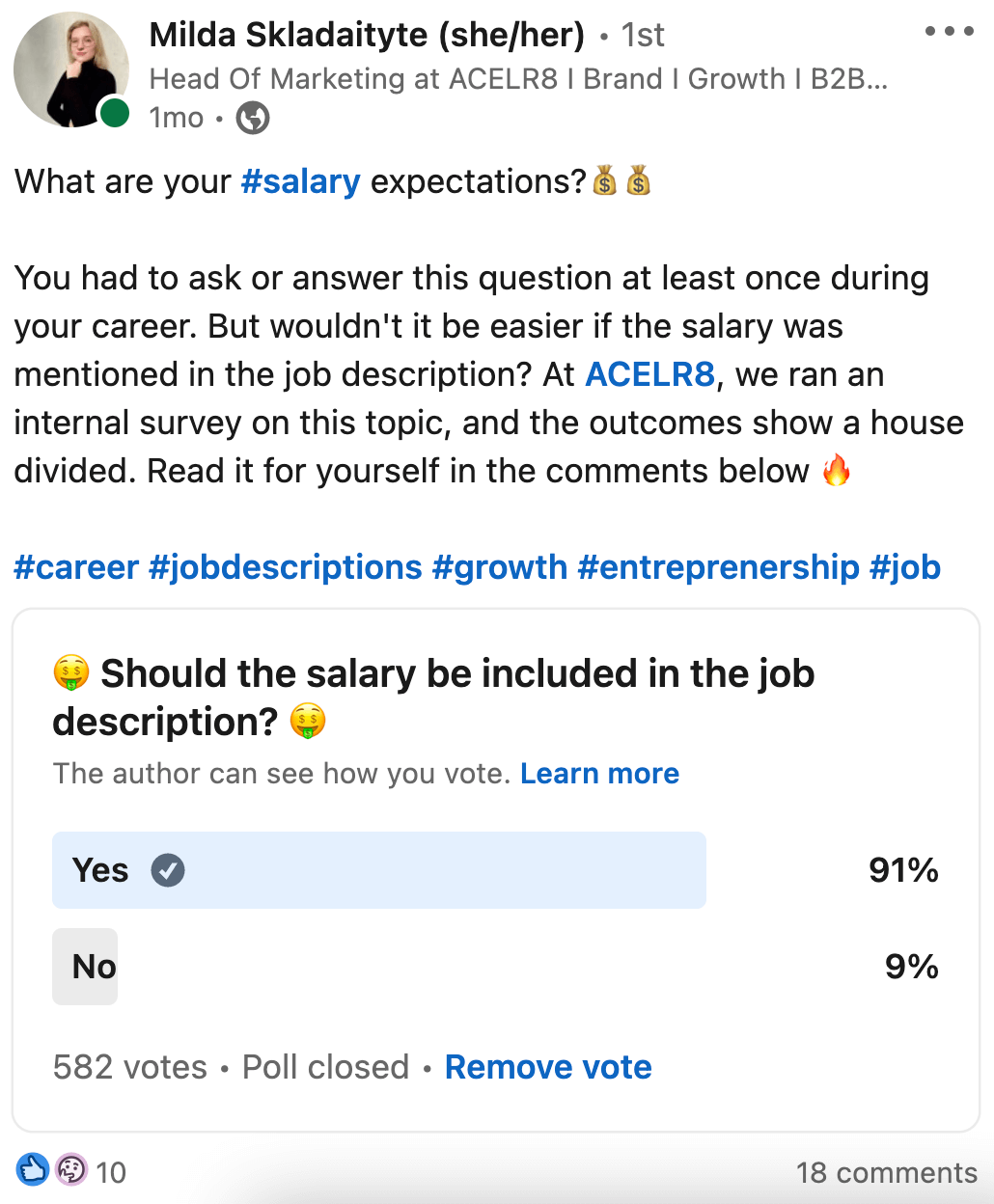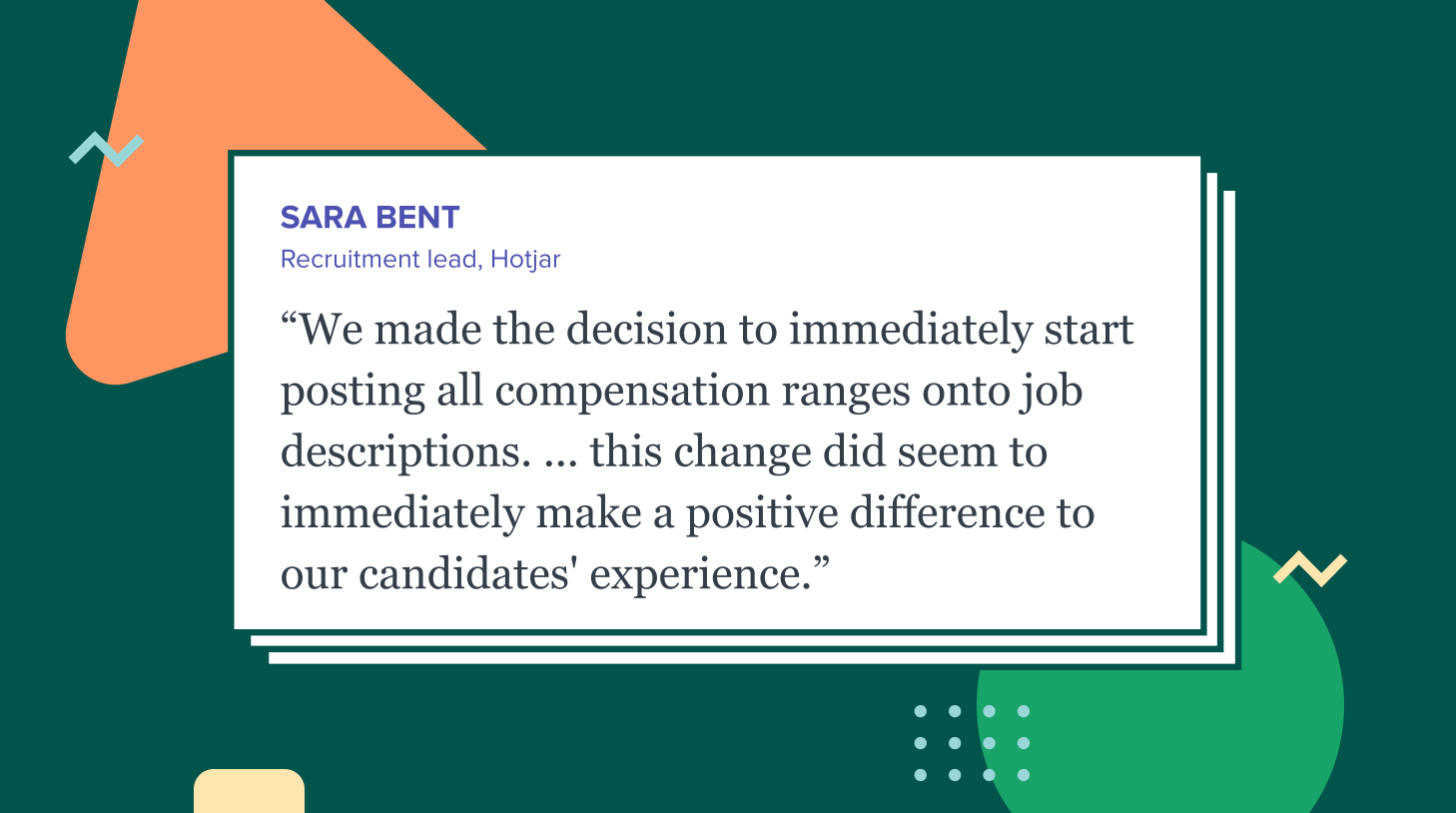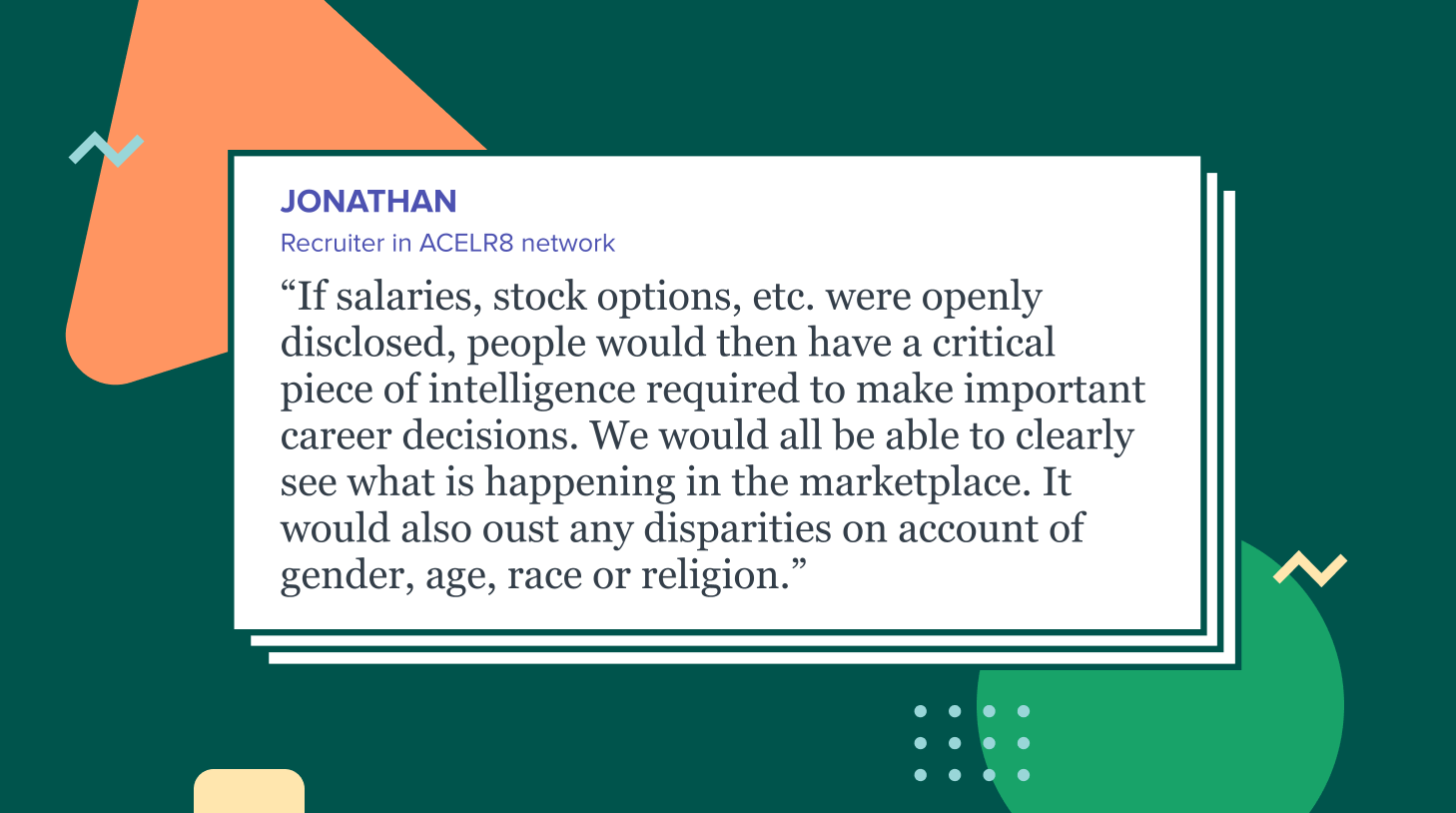Should you include salary in a job description? Let’s talk!
Including salary in job descriptions can promote transparency and attract suitable candidates, but it may also deter potential applicants or attract unsuitable ones. Companies should consider their hiring strategy, industry standards, and potential impact on their reputation when deciding whether to disclose salary.

Every candidate is on the lookout for something different, and it’s impossible to tick every box. After running internal and external research, the ACELR8 team noticed that one box interests candidates more than any other part of the job description – the salary.
There are very few reasons for a candidate to apply for a job if the salary is below their threshold:
The real question is, if you want to attract top talent with high potential, should salaries be included in the job description?
As an embedded recruitment firm, the ACELR8 team works with a wide range of clients from a variety of industries. Despite this variety, there are many common themes that play a big part in creating a solid hiring strategy. One of the most well-worn paths is the discussion on salaries.
Should salaries be mentioned in job descriptions? Should it come up only in the interview stage?
Or, should they be not mentioned at all until the job offer stage?
It’s a hot-button topic right now and you’re looking for answers. To learn more, ACELR8 polled its talented team of recruiters to find those answers for you:
A third of our recruiters maintain that salaries should be shared only later in the hiring process, while twice as many believed the opposite.
To learn more, ACELR8’s Head of Marketing, Milda Skladaityte, posted the same question on LinkedIn. Here, things were a little different.
Out of 582 votes, an overwhelming majority of 91% wanted to see the salary in the job description.
This is an interesting finding, because it shows that there are completely opposing views on the market. At first, this may seem off the mark, but when you look at the reasons why, the issue becomes a lot clearer.
So, we spoke with Sara Bent, the recruitment lead at Hotjar, to learn more about Hotjar’s opinion on disclosing salaries.
“When I first started with Hotjar, I set us up with a Glassdoor account. The interview reviews that came through on it quickly highlighted one main area causing a negative candidate experience,” Sara explained.
“With candidates who we wanted to move forward with beyond the initial application stage, we’d email them to ask about their minimum compensation expectations. Our intention with this was to be sure that we would only move forward with candidates who fit within our compensation banding; we wouldn’t want to waste a candidate’s time if we knew we couldn’t match their expectations.
The Glassdoor reviews, though, made it clear that a lot of candidates felt we were doing this to ‘lowball’ them – plus these extra emails could add days to a candidate’s recruitment journey.”
That conclusion motivated Sara to be more open about salaries in job ads. And the response was quick and favorable.
“So, based on candidate feedback and guided by our own core value of building trust with transparency, we made the decision to immediately start posting all compensation ranges onto job descriptions. If we use the Glassdoor reviews as a measure of success, this change did seem to immediately make a positive difference to our candidates’ experience.”
Salaries are a tough topic to negotiate and discuss, and it’s often easy to scare away or disincline candidates. What Sara found, though, was that asking for feedback and adjusting processes to suit the candidate’s expectations was a quick, insightful, and easy step to take.
To learn more about people’s reasonings behind salaries and job descriptions, we asked our recruiters more questions. Let’s start with why many recruiters believe salaries should be disclosed in job descriptions.
Salaries in job ads: the argument for
Another recruiter made it clear – it’s about being transparent.
“I believe that transparency in hiring is the most important value. I believe that if we are hiding the salary, we know we pay less than we should or we are not transparent internally. Also, it may be that people in the company earn less than we are now offering to the new candidates.”
Transparency is a vital aspect of a well-run business. If everyone is on the same page and respects each other, the culture of the company will undoubtedly improve.
By disclosing the salary at the very beginning of the process, you start off on the right track – by creating trust. As said above, this not only allows the potential hire to understand their financial position, it can also give current employees an insight into the salary structure of the company.
This, in turn, mitigates any risk for attrition.
Moving with the times
Another important factor to take into consideration is that approaches and attitudes to disclosing salaries have changed considerably in recent years.
Another recruiter, Jonathan, explains:
“It’s something of an archaic taboo in my view,” Jonathan says. “Pay is often tied in with feelings of self-worth, so to openly discuss it manifests as either an ego boost or feeling undervalued.”
Candidates are also at a major disadvantage when it comes to salary disclosure, he adds.
“What has happened is people no longer have any real grasp of salary banding from industry to industry or role to role. The only people who know what the correct salary expectations broadly are, are recruiters. People generally have no idea whether they are under or overpaid…who can they compare to?”
And opening up that discussion from the get-go can make significant positive differences – not just for the individual candidate but overall benefits as well.
“If salaries, stock options, etc. were openly disclosed, people would then have a critical piece of intelligence required to make important career decisions. We would all be able to clearly see what is happening in the marketplace. It would also oust any disparities on account of gender, age, race or religion.”
These are some excellent points that lead to a much larger issue of diversity, equity, and inclusion. By creating a more transparent salary structure, everyone, including outside candidates, gets a better understanding of their financial self-worth.
In all, disclosing salary expectations allows for a level playing field and a transparent hiring process that ensures that time is not wasted and equal opportunities, both internally and externally, can be achieved.
Let’s look at the counter-argument. While disclosing salary does save time at the outset, but there are many eye-opening implications from our recruiters.
Salaries in job ads: the argument against
“I think companies have much more than a salary to offer … a remote-work policy, stock option, different benefits,” says another recruiter in the network. “It’s a complicated topic because I also see a potential benefit in having the salary on the job description.”
The modern company has to offer more than just a good salary. Remote-first working, equity options, and a whole host of other benefits can be just as important to potential hires.
For example, an early-stage startup will often not be able to compete with an established company for talent due to its lack of resources. However, incentives such as equity, bonuses, and remote work can level the playing field. Disclosing the salary may skew the candidate’s impression of the full value of the position.
Another recruiter shared three reasons why disclosing the salary may be problematic:
- The salary can put people off of applying if it is too low or below current salaries. Then, the company also gets a reputation in the market for underpaying.
- It can encourage juniors or unqualified people to apply to more senior roles if they are attracted just by salary and the bands are too high.
- It can run into situations at the end of a process if you offer 80k but the candidate sees the band pays up to 90k.
Overall, disclosing the salary puts the ball in the court of the candidate. It can lead to a glut of unsuitable candidates applying for the role, can affect the reputation of the company, and can also make closing the deal significantly more difficult.
Competitive issues
Another issue that may arise is that competing companies will see your offered salary and now know the benchmark for out-offering you.
Yet, while disclosing all your cards early in the game certainly gives the other players an advantage, it also avoids spending time on candidates who are unsuitable for the role.
There is also the issue of under-offering. If a company discloses their salary offer in the job description and it is much lower than the expected amount desired by the client, they won’t bother applying for the job.
In all of these situations, it’s important to remember to take things on a case-by-case basis. Every employer is different, and one rule does not apply to all. Take the time to understand what your company really needs, and approach the salary dilemma from there.
The issue of salary trends
The other aspect of the salary issue comes into what we’ve discussed previously: salary trends are changing fast.
2020 and 2021 have been two of the most paradigm-shifting years in hiring trends, communication methods, and work environments. A large population of the world had to change their work habits, and so they have become used to a certain style of employment.
Now, many people are leaving old jobs which do not adhere to their desired lifestyle, creating a boom in candidates and employers vying for position. This has led to a wide series of changes, including in the world of salaries and salary estimates. Again, we asked recruiters what they thought.
To the future: salary trends in 2022
“Aside from a competitive salary, companies need to offer competitive benefits to stay ahead,” says one recruiter. “These can include remote work, hybrid, flexi-work, company equity, family days/additional sick days, mental health days, remote office set-up allowance, learning and development budget and room for career growth.”
As above, salary is not the one carrot which you can use to lure a great candidate into your company. After COVID, people have higher expectations for work-life balance and the availability of remote work – this is documented along with the importance of compensation in the Great Discontent study released in September 2021.
By creating a progressive offering and work environment, you can attract exceptional talent that is looking for those freedoms and benefits.
Another issue in regards to the shift of work to remote is the issue of salaries. Hiring has gone global – EU-based candidates that would recently have had no chance of getting a role with a German company, for instance, can now count on being considered.
One recruiter explains:
“A thing I have noticed is that as remote work soars, candidates who are working remotely for San Francisco/Silicon Valley start-ups are getting paid San Francisco salaries and they then will expect this level of compensation in Europe.”
Now, when you’re hiring, you have the entire globe as a talent pool. This issue is only going to become more widespread as time goes on. The world is more interconnected than ever before, and it is up to you to learn how to adjust your hiring strategy to counteract this.
Learn more about the global talent market in our podcast or read about it here.
Choose wisely
In the end, the choice of whether to disclose the salary or not is up to you and your hiring team. But, hopefully, this article has helped to shed some light on the pros and cons of each situation.
A high salary posting can certainly attract excellent candidates, but it’s important to ensure you can foot the bill when it comes to the offer stage. Additionally, the only way of maintaining this appraisal is to create a transparent salary structure throughout your company. This avoids issues of unfair pay, employee morale problems, and general miscommunication.
When it comes to keeping your cards close and not mentioning the salary, make sure that you are supplementing that with another attractor important to candidates. Excellent candidates will only respond to well-thought-out and attractive job descriptions. Promote your company values and ambitions to entice top talent into the application process before they even think of the salary.
Again, in the modern world of recruitment, salary is not everything; other benefits can become even more important to candidates – especially issues such as remote working or flexible hours.
Take the time to really understand the job position – who is the ideal candidate? Will they respond better to a high salary or company equity? Are there other benefits which haven’t been considered yet?
The world of recruitment is dynamically changing, and it’s important for each company to take a deep, introspective look at how they want to hire. Jobs descriptions need to be more than just salary postings now. Although, statistically, it may seem as though the public wants to make sure salaries stay present.
Above all: stay transparent, don’t overpromise, and remember to keep an open mind.
Lewis Mc Cahill is the Content Marketing Manager for ACELR8. With over half a decade of experience, he has worked with a range of major brands and upcoming startups alike. With ACELR8, he is helping push the Embedded Recruitment Model forward with the help of the rest of the marketing team.
Frequently asked questions
- What are the pros and cons of including salary in job descriptions?
- Including salary in job descriptions can attract suitable candidates who align with the pay range, promoting transparency and trust. However, it may deter potential applicants if the salary is perceived as too low or attract unsuitable ones if it's too high. It can also create challenges in negotiation if the offered salary is at the lower end of the disclosed range.
- How does salary disclosure impact the company's reputation?
- Salary disclosure can impact a company's reputation in various ways. If the disclosed salary is lower than industry standards, it may give the impression that the company underpays its employees. Conversely, a competitive salary can enhance the company's image as a fair and attractive employer.
- What are the implications of not disclosing salary in job descriptions?
- Not disclosing salary can lead to a wider pool of applicants, as candidates may apply based on the role and company rather than the salary. However, it may also lead to wasted time if candidates' salary expectations do not align with the company's budget.
- How does salary disclosure affect salary negotiations?
- Salary disclosure can simplify negotiations as both parties are aware of the pay range from the outset. However, it can also create challenges if a candidate expects a salary at the higher end of the range and the company offers a lower amount.
- What factors should a company consider when deciding whether to disclose salary in job descriptions?
- Companies should consider their hiring strategy, industry standards, the role's value, and the company's compensation structure. They should also consider the potential impact on their reputation and the expectations of their target talent pool.







